Guide: What is JournoLink and How Do You Use It?

In the many years since Help A Reporter Out was invented, many other people have tried to make their own versions of the platform. Some of them did little or nothing to change the formula, while others made so many changes they essentially invented something entirely new. The basic idea was so solid, though, that it still endures as a way to build links and citations, even though the original HARO is now retired.
One of those many attempts to replicate the success of HARO is JournoLink. Their list of clients includes over 17,000 small businesses, and their distribution network includes platforms like the BBC, the Daily Mail, Sky News, The Guardian, and The Times.
JournoLink is a fairly well-trusted and successful platform, so how does it compare to the original HARO formula, and how can you use it for your own outreach and link-building?
What is JournoLink and How Is It Unique?
First, let's talk about the basics of the platform and what makes JournoLink stand out from other sites in the same general PR space.
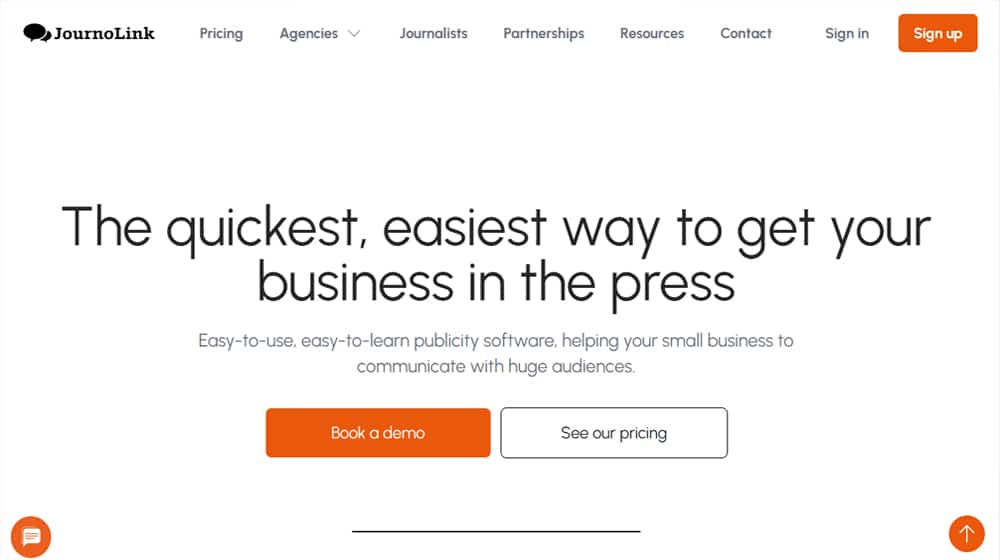
JournoLink seems like a HARO-like platform at first glance, but in reality, it's actually a lot more like a traditional PR platform or outreach app with a few HARO-like features. It still divides its audience into journalists and sources – just called agencies or marketers – but the main features of the site are fairly different.
Being a Source on JournoLink
Marketing Agencies or PR Agencies on JournoLink gain access to quite a few useful features for outreach and link building.
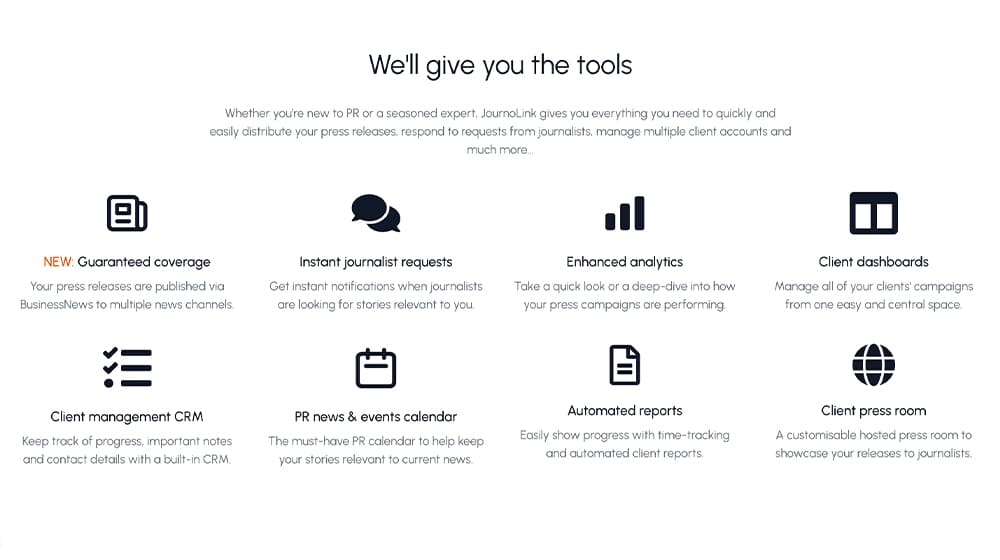
First up, you get the Media Contacts database. This is a hub where you can see the names, contact information, and other key information about journalists, as well as publishers, bloggers, influencers, and anyone else who publishes content. I'll generally refer to this pool as journalists, but there are a lot of people who don't explicitly fall into the category of journalist here.
It's worth noting that you don't just get unfettered access to the whole contact list. Some are freely available, but others require you to buy the list they're on. There are lists for local and regional journalists, national journalists, and more.
Next, you get access to Instant Journalist Requests. This is the most HARO-like feature of the site, where journalists in need of a quote or information put out a request, and you can respond to it. You know the drill on how this works by now, I hope.
A lot of the additional features for marketing agencies center around analytics, dashboards, and reporting. This is because you can actually white label and resell access to their platform and track and report individual client activities.
Another feature some people will find useful, but others might not, is access to the PR Learning Centre. This is basically a big resource guide on how to write and promote press releases. There's nothing there that's really novel or worth buying on its own, but since it's a freebie included in all their plans, it's worth taking a look.
Finally, and this is something I'll talk more about later, you get Press Release Distribution services. JournoLink allows you to send press releases to lists of journalists, so even if you don't see any journalist requests that suit your needs, you can send out your own outreach quite easily. They also have Guaranteed Coverage with certain press releases, which means it automatically publishes your press release on various press release submission sites. I have a lot to say about how viable this can be, so read more about it here.
Finally, you get a PR Calendar. This is basically their internal feed of events and press releases, as well as upcoming news and scheduled journalist requests. It's kind of all lumped together and can be clunky to use, but it's a decent overview of trends you can follow.
Pricing comes down to three packages. Note that there are no free plans or free trials.
- Micro. This plan has zero press releases included but costs £80 per press release you want to send. You don't get guaranteed coverage either, but you do get access to journalist requests and have an unlimited ability to respond to them. This plan costs £12 per month.
- Starter. This plan runs you £59 per month and is basically identical to the Micro plan, except you get guaranteed press release coverage and one monthly press release for free.
- Unlimited. This lets you submit as many press releases as you want and bumps the cost up to £119 per month.
There are also multi-business versions of the plans, which add on team members and business profiles, as well as more press releases monthly in the Starter plan, for added fees. Critically, they also add Business Profiles, which are static profiles of who you are (or of businesses you represent) that journalists can see. You get one with Micro and two with Starter and Unlimited, and you can buy more for £10 each. These can be very nice to have in case a journalist wants to reach out directly.
One interesting aspect of JournoLink is that they have a robust set of content guidelines for the press releases they allow through their platform. They reserve the right to not publish one if they think it violates their rules. One of those rules is against SEO content, and another is a requirement that the press release is for Actual News, so the whole platform is a little less useful for basic link-building than you might hope.
Being a Journalist on JournoLink
As with most HARO-like platforms, journalists are the primary source of value, so there's no charge to sign up as a journalist. You have two options: you can submit a journalist request, or you can sign up to receive press releases.
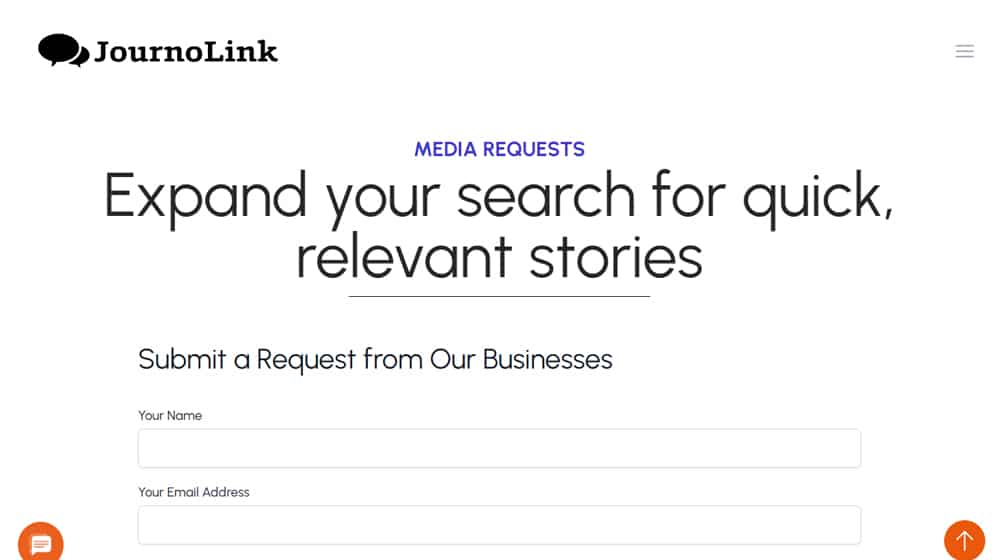
Submitting a media request means going to this page and filling out the form. They want:
- Your name.
- Your email address.
- The topic of your request. You can only pick one, and there are over a hundred options on the list, but it's mostly a broad category filter. Think of "Immigration" or "Health Insurance" as categories.
- The subject of your request. This is equivalent to the title of an email and needs to be short and attractive.
- Your full request text. This is the usual set of "what you want, what you don't want, who you want to reply," etc., requirements that most of these sites use.
- Your publication or blog. They don't require that you list a URL, but at least a name is necessary.
- Whether or not you're targeting specific industries. This is also a very long list you can pick from and is different from the list of topics, but it's also optional as an additional filter for responses if you want to use it.
- The deadline for your request. This is largely important for the PR Calendar, I believe; I think submitting a request puts it in the pool right away, regardless of the date you put down.
When you fill out this form and submit your request, it goes to the sources who can respond to it and to the PR calendar for people who aren't subscribed or watching the notifications to see.
Submitting requests is free, and there doesn't seem to be any limitation on how many you can submit, though I imagine if you abuse the platform too much, they might not be happy about it.
The other thing you can do as a journalist on JournoLink is sign up to receive press releases. This is basically just a mailing list where you receive press releases submitted by sources. All you need for this one is:
- Your name.
- Your email address.
- Your publication name/URL.
- A choice of business industry if you want filtered releases for specific industries.
- Your topics of interest, also for filtering purposes if you want to weed out the chaff.
- Your location. I'll mention more about this later, but it's just choosing a specific region so you can show up on the locally relevant journalists list.
Once you've signed up, you get outreach via press releases and can do with that information what you will. It's no different from signing up for any other press release service or just checking PR Newswire or whatever other press release site you want to use.
The Biggest Limitation of JournoLink
I use every one of the PR and HARO-like platforms I write about, mostly as part of my link-earning service, so I can see first-hand how well they work and what their limitations are. In this case, JournoLink has a pretty big one. In fact, I've already mentioned it, though I strategically left off three words that would have given the game away. Let me draw your attention to this sentence in the second paragraph of this post.
"Their list of clients includes over 17,000 small businesses, and their distribution network includes platforms like the BBC, the Daily Mail, Sky News, The Guardian, and The Times."
Do you see it? All of those media outlets are British. The prices listed above are also in £, which is another hint. And those three missing words?
"Their list of clients includes over 17,000 small businesses throughout the UK."
That's right; this is a British HARO-like. As a journalist, if you go to add your location, you're limited to just counties in the UK to choose from. There are no international options whatsoever.
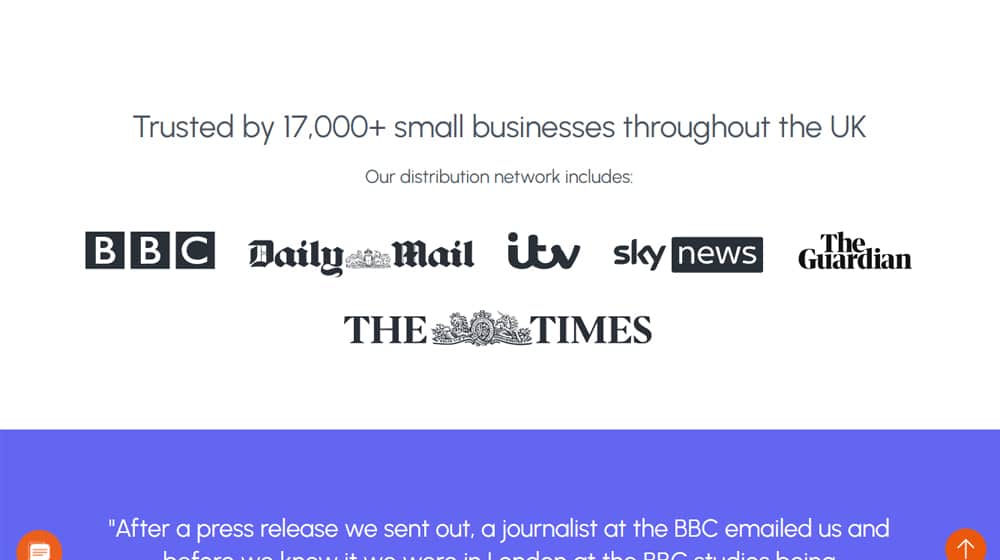
To be clear, you can still use JournoLink if you don't live or work in the UK. As a global agency with clients all around the world, I sometimes have a great use case for a regional PR service like this. But, it does mean that it's not really appropriate for certain kinds of businesses and blogs.
On the Sources end, if you're a local business or a business limited to US operations, getting links and coverage in British media – even international media like the BBC – might not be very useful. It can be, specifically in publications like the BBC, but for the smaller journalists, it's not as valuable.
As a Journalist, you have to expect that the majority of the sources responding to your requests or submitting press releases to you will be based in the UK. Again, nothing wrong with this, but you're likely to encounter a lot of British perspectives that might not be useful to you.
Overall, it's a narrower platform than you might think based on the name and description, and that's largely due to the geographic focus. I can't really fault them for it – it's a business founded by three UK residents, after all – but I do think sometime in the ten years since they were founded, they could have tried to expand if they wanted to.
How to Use JournoLink for Link Building
I have to say, there's not a lot of nuance to using JournoLink for link-building beyond what you already know. In brief:
Pick the right account type. I recommend the Micro Multi-Business option because it gives you a static business profile for journalists to see, access to requests, and only costs £12 per month.
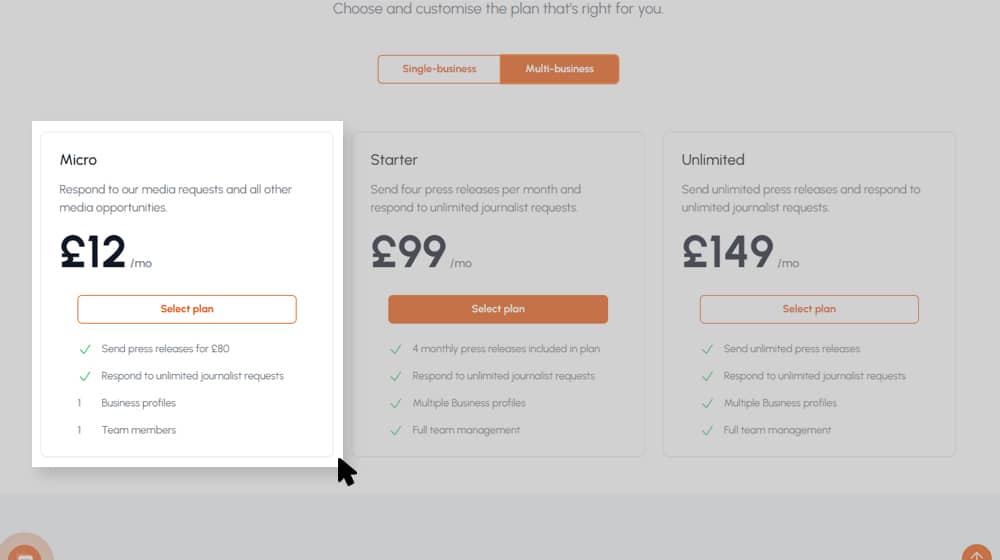
Watch for and respond to appropriate journalist requests. I have several resources on how to do that here on my site, but it mostly comes down to being precise, valuable, and fast.
Don't worry too much about press releases. Personally, I think press release marketing is one of the least valuable methods to get awareness or links unless you have something legitimately press-worthy, which is pretty rare in our space. I don't find it worth paying for press release submission, but maybe you would. You can always give it a try!
I will say that the analytics that JournoLink gives you are fairly nice, as are the client management dashboards if you're an agency like me and can make use of multi-client tracking. Overall, though, the relatively narrow British focus and the emphasis on press releases (and the higher costs because of it) make it a little less useful of a platform for most of us than many others out there. If you've found success with it, though, let me know! Or let me give it a try for you.










Comments